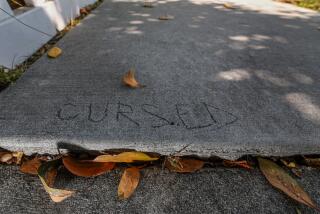Trouble Surfaces Amid the Muck, Luxury Homes of Westlake Lake
THOUSAND OAKS — In the bit of man-made paradise that is Westlake Lake--a heavenly enclave of luxury homes and giant willow trees, cocktail-hour pleasure boats and colorful regattas--there is trouble.
The lake itself is badly in need of dredging. Members of the homeowners’ association have sued themselves to change how much each household should pay to maintain the lake. And longtime residents are squabbling with a leading group of newcomers, charging that bickering over dock lengths and other petty things has forever warped what was once a neighborly community.
“I’m getting out of Westlake, and the primary reason is this homeowner fracas,” said Victor Ouimette, a 24-year resident of private Westlake Island. “You’re supposed to go home and relax. Here people go home and call their lawyers.”
The problem: Because the system for determining lake maintenance fees--devised before Proposition 13--was based on property taxes, vexing inequities existed between the haves and, well, the newer haves.
Some longtime homeowners in this master-planned community, including some of the wealthiest people on “the island,” paid as little as $50 a year for lake upkeep, while more recent residents forked out as much as $1,500.
The usual way to deal with such a disparity is to get all the homeowners to vote on fixing the system. But that is not what occurred at Westlake Lake, which straddles Los Angeles and Ventura counties, with about one-third of the area making up Westlake Village and the rest the Westlake portion of Thousand Oaks.
Admitting they could probably not muster the two-thirds vote needed from the lake’s 1,312 households to change the homeowners’ association code, a faction within the association decided to sue the association--in essence, suing itself--to achieve the same means.
*
Earlier this year, the newcomer-dominated group was victorious: a Los Angeles County judge approved a settlement between that group and the homeowners’ association, which decided not to fight the suit. As a result, assessments at the lake will now be based on home market value--which means many people will see their fees increase or decrease by hundreds of dollars.
Now some old-timers are mad--not because of the money, they say, but due to the principle of the thing. They claim a litigious group of newcomers, bent on turning Westlake Lake into a waterfront Beverly Hills, is determined to squeeze them out through intimidation. Some are talking about an appeal. Others are talking about leaving.
“They’re the new regime, and they want help paying their bills,” said Renee Nadel, who has owned a house on the island for 15 years. “Well, don’t we all! I’m not into welfare, and if I were, my money wouldn’t go to the rich people on this lake.”
Such characterizations are purposely outrageous, said Edwin Trent, one of the named plaintiffs in the suit. Opponents of the change are trying to paint his side as undemocratic only to protect their own little fiefdoms, Trent said.
“They’re a bunch of greedy people that have a good thing going, and they don’t want anything to change,” said Trent, who, as an 18-year resident of the island, is no newcomer. “There’s definitely some angry people around here right now. But there’s always some people around here angry over something. That’s the story of this little lake. There’s always something going on.”
Westlake Lake was created in 1967 by shipping magnate Daniel K. Ludwig’s American Hawaiian Steamship Co., which developed the 12,500 acres of surrounding ranchland into one of the nation’s first instant cities.
Billed as “The City in the Country,” the community was depicted in a 1970 Time magazine article as the crowning jewel of Ludwig’s $1-billion empire.
It was certainly an ambitious undertaking: The company also built the adjoining 18-hole Westlake Village Golf Course, the nation’s first links lighted for nighttime play, and what was then the world’s largest privately owned dam.
Ludwig wanted the future city to lie entirely in one county. But neither Ventura nor Los Angeles counties would budge, and the 150-acre lake ended up on the county line--a situation that often results in confusing jurisdictional problems.
Neighbors’ children often attend different schools. The community is served by two fire departments, two sheriff’s departments, and has two area codes, 805 and 818.
Nevertheless, the cachet of Westlake Lake, with its prestigious yacht club and tranquil, exclusive atmosphere, has proven strong. Smallish lakeside homes purchased for $100,000 two decades ago are now selling for $1 million and up.
*
But the centerpiece artificial waterway, which will soon be 30 years old, is beginning to show serious signs of wear. Its shoreline is eroding in places, chemical treatments are needed to corral overabundant algae, and a thorough dredging is long overdue, according to many residents.
Further compounding matters is the golf course, which drains water from the lake to sprinkle its links. The relationship between the golf course and lake residents erupted two years ago, when homeowners watched lake levels plummet to record lows, their docks resting on dirt and their boats scraping bottom.
Outraged residents flooded homeowners’ association meetings, demanding that the golf course’s pumps be turned off. But homeowners learned they had no control over the pumping. Although the water has risen substantially since, the problem remains unresolved--and some of the divisions it fostered among homeowners are evident in the latest dispute, both sides say.
Benson Schulman, a retired schoolteacher and former homeowner association president, believes the frequent resident disputes at the lake stem from a lack of understanding of what it takes to maintain a man-made waterway.
“Frankly, the level of assessments hasn’t been adequate for years,” said Schulman, who contributed “several hundred dollars” toward the assessment lawsuit. “This is not an area of poor people. No one can claim poverty here. We live in one of the most beautiful areas in Southern California. It comes down to this: If you want to live here, you have to pay your share.” Schulman, who has lived on the lake since 1984 and paid $600 in assessments last year, said he expects the payments to rise. He understands that some residents are upset with the way the change in payments has come about. But he believes it was the cheapest way to do the right thing.
“No one knows if the change would have passed,” Schulman said. “But we know this for sure: we would have had to ignore some major problems, or borrow some money to fix this lake.”
*
As it stands now, the lake’s homeowners’ association is still considering borrowing several hundred thousand dollars to perform the repairs.
William Rolland, a developer who owns seven properties at the lake, said he would have had no quarrel with the change had it been approved by residents. But the current leadership of the homeowners’ association, mainly made up of more recent residents, “did an end-run” around the people they represent, he charged.
“I believe it was insider dealing at its worst,” said Rolland, who is involved in a bitter legal dispute with the homeowners’ association over the length of his dock. “There are a lot of people who don’t even know this happened.”
Lenny Targon, vice president of the homeowners’ association, disagrees with Rolland’s depiction of the lawsuit. Targon--who said he had nothing to do with the suit--believes residents have a right to sue the homeowners’ association, even if they are a part of it.
“If you think you are being treated unfairly, what do you do?” said Targon, a resident since 1988. “I guess the homeowners did sue themselves in a sense. But so what? I don’t know how the opponents of this think it’s fair that they are paying $80, and their neighbor is paying $800.”
Civility and neighborliness are beginning to suffer as a result of the dispute between the newcomer-dominated homeowners’ group and old residents, according to Kay Satchel, a retired accountant who has lived on the island 14 years. She is planning to move.
“Sue, sue, sue--that’s what this place is like nowadays,” said Satchel, the former homeowner association treasurer. “And the minute they see a code infraction, they turn each other in.
“If someone’s dock is too long or boat is too tall, that’s cause for a fight now,” she added. “It’s like living with your stepmother. People used to greet each other walking around the lake. Now everyone is aloof.”
More to Read
Sign up for Essential California
The most important California stories and recommendations in your inbox every morning.
You may occasionally receive promotional content from the Los Angeles Times.










